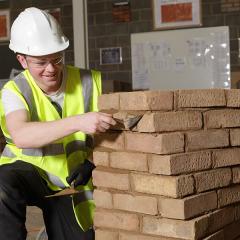Did you know that in the UK, construction is one of our largest industries? Offering hundreds of different job roles working on many different tasks, over 3 million people work in construction in the UK alone.
Recently, the amount of workers available for construction projects hasn't kept up with demand, leading to a skills shortage. With many construction firms now turning to apprenticeships to train up new members of staff in bricklaying, there's never been a better time to consider getting into work as a bricklaying apprentice.
Earn While You Learn
Tradespeople can earn more than £50,000 a year, according to research from the Federation of Master Builders (FMB) 2020. The key statistics are:
- Bricklayers, carpenters and plasters can command an average day rate of £175, equating to £53,200 a year.
- Some tradespeople are paid up to £275 a day for their work.
- 53% of construction bosses are struggling to hire carpenters/joiners.
Of course, as an apprentice you won't earn that much straightaway, but you'll earn an apprenticeship wage while you're learning on the job. Your employer will be responsible for ensuring you learn the skills you need to become a competent carpenter and joiner, and you'll be supported with regular learning at East Durham College too.
What Can I Expect as a Bricklaying Apprentice?
No matter where you look, construction is probably taking place.
Whether it's building a home, a hospital, school, energy and transport infrastructure or a wide variety of other buildings, the demand for skilled construction workers is always present.
As a bricklaying apprentice, you'll gain real, on-the-job experience of the day-to-day activities of a bricklaying professional. Overseen by senior staff members, you'll be expected to learn new skills as you progress, work on your own initiative and work to a high standard throughout.
During your working day, your main activities will involve laying bricks, blocks or other types of building materials in mortar to construct/repair walls, foundations, partitions, arches and other structures such as chimney stacks. You may find yourself working on many different sites over the course of your apprenticeship. You may complete projects such as developing large commercial buildings (hospitals/schools etc), be building new homes in a residential area, alter existing properties, complete extensions or complete restorations.
Bricklaying is generally a team-based career, where you'll work alongside other bricklaying 'gangs' to complete work alongside other building professionals such as labourers and site/construction managers who oversee the project.
If you enjoy manual, practical work, working with a team of hard-working professionals and a challenging, rewarding career, an apprenticeship in bricklaying may be exactly what you're looking for.
What Skills and Knowledge Might I Earn on a Bricklaying Apprenticeship?
During your apprenticeship in bricklaying, you'll gain knowledge of the following:
- Health and Safety - on-site workers are expected to work at all times to a high standard of health and safety. You'll learn about hazards, correct personal protective equipment (PPE) such as hard hats and boots to wear, dangerous materials and more
- Customer Service - although a bricklayer may not be customer facing, all work you complete will be to a customer's standards. You will learn to establish and understand the needs of customers, and to deliver their requirements to a high level of quality
- Communication - learn to work closely with others within a close team, communicating to solve problems and complete jobs more effectively
- Knowledge of Buildings - you'll learn about buildings from different eras and how they differ from one another, types of construction methods, insulation, sustainability, fire management and more. You'll also develop knowledge of trees and utilities and how they may have an effect on building work, as well as learning about damp proofing and brick tying
- Energy Efficiency - learn about the importance and considerations of thermal qualities, ventilation and air-tightness to improve overall building work
- Building Materials - you'll learn how to use, prepare and interact with a wide variety of materials used on site. You'll study their use and learn to understand why these materials are important, using such materials as concrete, drainage, different types of bond and more. You'll also learn how to effectively dispose of waste materials and recycling
- Alternative Construction Techniques - including rapid build technology, alternative block, masonry, steel and timber-based cladding systems
- Radial and Battered Brickwork - you'll set out and build brickwork, including complex arches and surrounding brickwork, curved on plan, concave and convex brickwork and battered brickwork
- Feature and Reinforced Brickwork - gain strong working knowledge of how to set out and build brickwork such as complex decorative features, obtuse/acute angle quoins and reinforced brickwork
- Fireplaces and Chimneys - learn to select the correct materials/resources needed to set out and build fireplaces and chimneys. Materials used may include chimney pots, flue liners, plinths, hearts and other modern methods
You will also learn to develop a wide variety of different skills. These will include:
- Preparing Materials - you'll learn how to determine the quality and quantity of building materials you need and learn how to mix ratios of mortar and concrete
- Safe Working - with your health and safety training, you'll learn how to work to any relevant construction-related health and safety laws, codes of practice. This may include working at height and the safe use of some site equipment such as disc cutters and power cutters
- Prepare and Maintain Your Work Area - how to select the correct tools, equipment and materials (examples may include trowels, levels, brick ties, insulation etc) for use when setting out and erecting masonry walling. This will also include maintaining a clean working environment that's safe for all around to work in
- Preparing and Completing Masonry Structures - a wide variety of skills will be learned under this field, including measuring the work area, setting out level first courses of bricks to a plan, including bonds for openings and the damp courses. You'll mix mortar by hand or with a mechanical mixer, lay bricks to set dimensions and apply mortar with a trowel to full completion. You may also learn to shape and trim bricks/blocks using hammers, chisels and power tools. Specialist equipment such as laser levels, spirit levels, optical levels and string lines may also be used to help you check that courses are straight, horizontally and vertically and laid to a gauge.
Register your interest in an Apprenticeship
If you can’t find a current Apprenticeship vacancy below that you are interested in, please use the short form further down the page to register your interest with the EDC Apprenticeship Team and they will contact you as a vacancy becomes available in the area(s) you are interested in.
Apprenticeship Vacancies
Please check out the live Apprenticeship vacancies below that are currently being advertised with some great organisations we are working with.
If you haven’t used the www.findapprenticeship.service.gov.uk Opens Government Apprentice site in a new window before you must create an account Opens Government site to register in a new window to apply. Creating an account allows you to:
- apply for an apprenticeship or traineeship
- track your apprenticeship applications
- receive alerts about new apprenticeships
To find out more information, please call the Apprenticeship Team on 0191 518 5508 or email apprenticeships@eastdurham.ac.uk.


